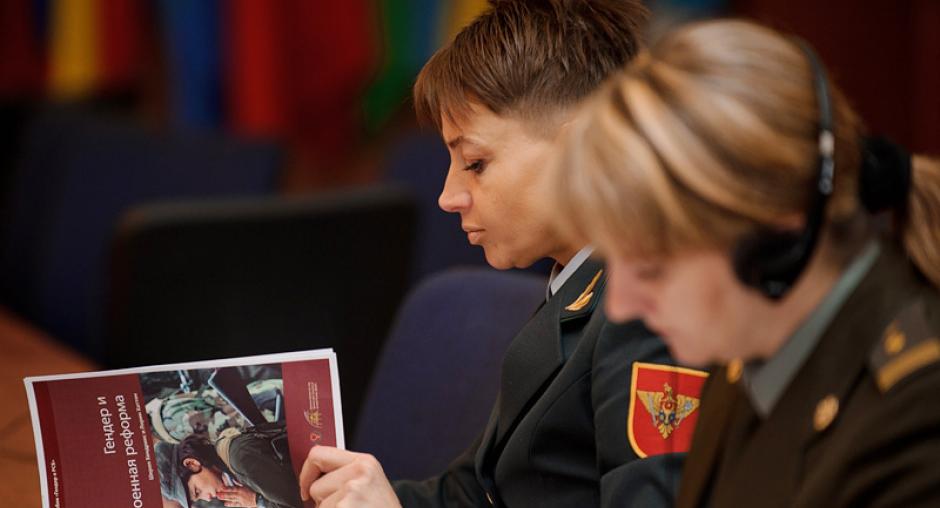OSCE on International Women’s Day – Flowers is not enough!
We use the occasion of 8th of March, the International Women’s Day, to acknowledge the enormous contribution made by women to Moldova’s society in the public and private sphere. Women all over the country receive flowers, chocolates, little tokens of appreciation. This day is an opportunity to take stock of the achievements made, but also to note the continued challenges faced by women in fulfilling their full potential.
More than 100 years have passed since the first International Women’s Day was marked in 1911. In 1975, the United Nations proclaimed the day as the UN Day for Women's Rights and International Peace. Throughout the time, women of the world have gathered and campaigned to claim their rights, as equal wages, the right to vote and to be elected to public office.
Women have gone a long way to ensure the place they deserve and are entitled to by law in their society and private lives. Women increasingly hold positions of leadership that allow them to influence the political, economic and social spheres of their country and represent the interests of more than half of the population. In Moldova, women are becoming better aware of their rights and how to claim them. Women are increasingly taking the courageous step of appealing to the police and courts to respond to domestic violence and human trafficking. They are asserting their skills and professionalism and their right to be employed, paid and given access to management positions on an equal footing with men, despite persistent stereotypes that cause direct or indirect discrimination. Women lead in the social and humanitarian sector, be it in public service or non-profit organizations, as well as care-givers, although this work is often unduly recognized, unpaid or underpaid.
Despite many successes, the path toward achieving gender equality remains paved by continued challenges that limit women’s opportunities and the fulfilment of their full potential.
Moldova’s women constitute 52% of the population, but their presence in elected bodies ranges only from 18% at the local level to 20% in Parliament. Women constitute about 55% of the population enrolled in higher education, but their skills and professionalism are not adequately reflected in the labour market. Here barriers to higher management and decision-making bodies persist and result in women’s salaries averaging 76% of that of their male counterparts. Over 60% of Moldova’s women experience domestic violence in their lifetime, a scourge whose cost for both individual women and the entire society continues to be underestimated. Many women continue to become sex slaves due to the underprivileged conditions in which they grow up, especially in rural communities.
This situation is not only the result of fate or individual choices. It often reflects missed opportunities to empower and support women in realizing their aspirations for their own sake, as well as for the benefit of their families and the entire society.
Fully implementing the rights enshrined in Moldova’s laws and international treaties would improve the lives of many women, their communities and the whole country. Many studies have demonstrated the contribution made by a greater participation of women to the democratic and economic development. Research has shown that countries with a higher degree of gender balance in the public and private sector at all levels have been less affected by the global economic crisis.
The OSCE Mission to Moldova implements a number of projects aimed at achieving the equal representation of women and men in public and political life. Mission’s projects have also focused on combating domestic violence and human trafficking, two major causes and consequences of gender inequality and discrimination. In its work, our Mission has partnered with Moldova’s state institutions and civil society.
The Mission conducts training seminars for judges, prosecutors, the police, lawyers and social workers on how to handle legal cases of domestic violence and human trafficking in court. The Mission has also helped set up a trust-line for survivors of domestic violence and assistance and counselling services for both victims and perpetrators of domestic violence. The Casa M. play and annual information campaigns have raised the awareness of the dangers of domestic violence based on real-life stories.
Training seminars for women running in the 2011 local elections consolidated their political representation and the chances to better reflect the interests of over half of the population of Moldova. Summer camps have empowered young women of both sides of the Dniester/Nistru river about life-skills education, how to start small businesses, and how to prevent domestic violence and trafficking. For the first time in Moldova, the OSCE Mission has trained army officers on how to increase women’s participation in the military, and young men of both sides of the Dniestr/Nistru on promoting gender equality and combat domestic violence.
It is on this last point that we would like to conclude. It is inspiring to see the increasing number of men and boys who advocate for women’s rights at different levels of the society. We would like to encourage men at all levels to act more and more as role models and take concrete action both in private and in public to promote women’s rights and combat domestic violence and trafficking. Flowers on the 8th of March are not enough!

